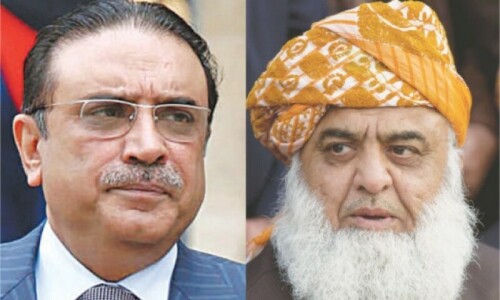 AGAINST the backdrop of a dismal outlook for the global economy, the oil prices hit a record $126.40 a barrel for the first time on May 12, 2008 and the cost of wheat, rice and soybeans also went up.
AGAINST the backdrop of a dismal outlook for the global economy, the oil prices hit a record $126.40 a barrel for the first time on May 12, 2008 and the cost of wheat, rice and soybeans also went up.
Prices are determined by demand and supply, but this mechanism seems to have broken down. As the financial crises deepened over the past year, commodity prices are going up and up. Funds have been diverted from the capital market for trading in commodities.
The World Bank has warned of a ‘silent famine’ hitting millions of poor in South Asia including Pakistan. The bank has recommended the regional states to devise food security through existing safety nets to protect the poor, “but social safety nets cannot protect every poor because a large number of people live below the poverty line in South Asian region”.
World Bank economist Ijaz Ghani said at a video conference on food prices -- A global prospective and the impact on South Asia -- that the social safety nets would have certainly fiscal cost and it would not be supported at the cost of microeconomic instability. He criticised the United States and the European Union on using food crops as biofuel, saying it has been creating distortion in the prices of commodities.
What are the reasons behind the increase in food prices? The main cause, according to Hans Timer, is the weakening dollar. The prices of rice escalated to more than $500 per ton now compared to $200 per ton in 2003. The peak oil prices, up from $70 in 2002 to $126.40 a barrel in a year, are a major reason for hike in food prices.
There is little to suggest that the dollar is going to gain strength, with the market expecting further cuts in US interest rates and borrowing cost in the euro zone to remain steady. As the G7 countries are not taking up the issue more seriously, the American policy makers seem quite content to let the dollar slide.
The World Bank report said “Pakistan is among the 36 countries that need an immediate assistance to prevent further deterioration”. Despite the fact agriculture is the backbone of the country, we are facing food crisis frequently since its inception.
The World Bank report also noted that, “prospects of wheat crop for 2008 in Pakistan are quite good,” but in reality it does not seem so. Despite the wheat season, a food crisis looms large in the country. It is a pity that our policy makers always ignore the demand and supply issues.
To learn a lesson from history, I want to pinpoint the economic policy of Sultan Alauddin Khilji (1296 - 1326), one of the ablest rulers of the Khilji dynasty during the sultanate period. His market policy was based four elements.
Price control: all necessities of life were made available at cheep rates and several regulations were issued to control price of food items along with other essentials of daily life.
Constant supplies: The sultan realised that his market policy could not be implemented until supplies of commodities remained uninterrupted and took effective measures to keep supplies constant.
Transport: An effective transportation of goods was ensured and provided all facilities to traders for the distribution of goods in time.
Rationing: The sultan ensured a fixed quota for everyone. He established a well organised administrative system to ensure the smooth running of this system.
Without doubt, we have a lot of resources but they need to be exploited systematically. The new government is advised to take urgent steps to control the situation, otherwise the country would face civil riots, like the violence that erupted two weeks back in Egypt and Haiti over the soaring food prices.












































Dear visitor, the comments section is undergoing an overhaul and will return soon.